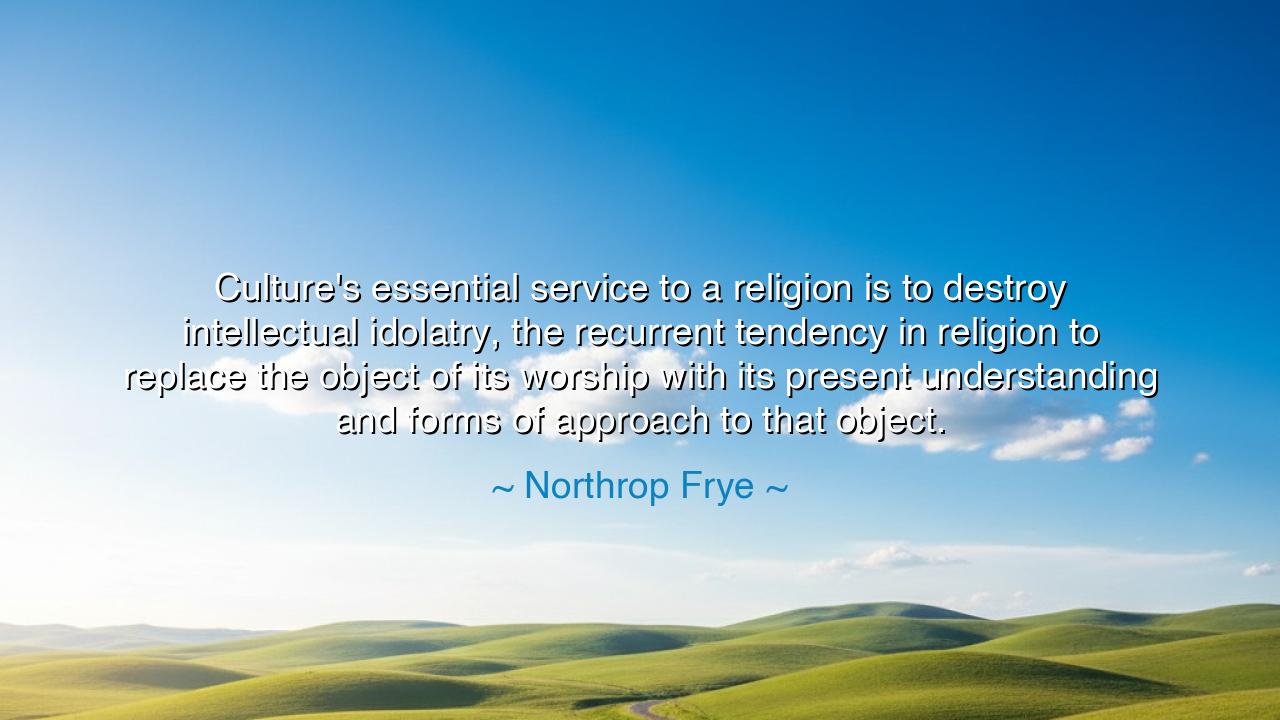
Culture's essential service to a religion is to destroy
Culture's essential service to a religion is to destroy intellectual idolatry, the recurrent tendency in religion to replace the object of its worship with its present understanding and forms of approach to that object.






Northrop Frye, wise among the interpreters of myth, once said: “Culture's essential service to a religion is to destroy intellectual idolatry, the recurrent tendency in religion to replace the object of its worship with its present understanding and forms of approach to that object.” In these words he strikes at a danger as old as faith itself—the danger of mistaking the vessel for the water, the shadow for the flame, the form for the divine mystery. Religion is born of awe before the infinite, yet over time, the human mind builds walls of doctrine, rigid words, and fixed images. Frye warns us that when worshippers cling too tightly to these constructions, they cease to seek the eternal and bow instead before their own inventions.
This is the meaning of intellectual idolatry. It is not the carving of golden statues or stone idols, but the enthronement of one’s limited understanding as though it were the eternal truth itself. Every faith risks this temptation: to believe that the rituals, words, and forms handed down are the very object of devotion, rather than signs pointing toward it. Culture, Frye teaches, performs a sacred duty here. By evolving, questioning, creating, and even rebelling, culture shakes the dust from faith, reminding it that the holy cannot be trapped in human formulas.
Consider the story of Galileo Galilei. In his age, the Church clung tightly to its interpretation of the heavens, mistaking its forms of approach—ancient cosmologies—for the truth of creation itself. When Galileo lifted his telescope and revealed the stars in their true orbits, he was branded heretic. Yet history vindicated him, and culture was the hammer that shattered intellectual idolatry. Religion was reminded that its object of worship was not the diagrams of men, but the living God who made the cosmos greater than human eyes had dreamed.
And so it has been in every age. The Hebrew prophets tore apart empty sacrifices, crying out that righteousness and justice mattered more than ritual slaughter. The Sufis of Islam danced in ecstatic poetry, resisting the prison of dry legalism, and declaring that God was found in love, not only in law. The mystics of Christianity spoke of the divine darkness, where words dissolve and silence reveals what creeds cannot contain. In each case, culture—through art, poetry, protest, and vision—broke the chains of idolatry and led the faithful back to the living source.
Frye’s wisdom teaches us that religion without culture petrifies. It becomes a monument, not a path. But when culture serves religion rightly, it keeps the fire alive, reminding the people that the truth cannot be caged in any single thought or rite. The divine is always greater than the names we call it, always beyond the grasp of one age’s understanding. Thus, culture is not the enemy of faith, but its purifier, its mirror, its challenger that prevents worship from decaying into the worship of worship itself.
The lesson is plain: do not mistake your present understanding for the eternal truth. Let art, story, and dialogue challenge your certainties, for in the breaking of idols, the divine shines through afresh. If your faith is shaken by a poem, a painting, or a new idea, do not fear—perhaps it is culture performing its sacred service, tearing away the false so that you may behold the true.
Practical actions are simple but profound. Read beyond the texts of your own tradition; listen to the songs of other peoples; let culture expand your heart. When you feel anger at those who question your faith, pause and ask: Am I defending the holy, or merely my own understanding of it? Dare to let your idols fall, knowing the eternal cannot be destroyed. Build a faith that grows, that breathes, that welcomes mystery.
O seeker, remember Frye’s wisdom: culture destroys idols not to weaken faith, but to save it. Every temple, every book, every ritual is but a bridge, not the shore itself. Do not bow before the bridge—cross it. Do not worship your own understanding—let it break, so that you may see more clearly the boundless reality beyond. Thus will your faith remain alive, and thus will you walk the path not of idols, but of the eternal.






AAdministratorAdministrator
Welcome, honored guests. Please leave a comment, we will respond soon